March 29, 2018
HMRC signs for Manchester HQ as part of nationwide programme of lettings
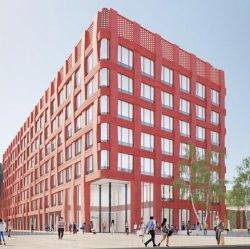 HMRC has completed a 25 year letting of 157,153 sq ft at the English Cities Fund’s New Bailey development in Greater Manchester. HMRC will take over the whole of the seven storey 3 New Bailey development with staff moving in from 2022. The move is part of a nationwide programme of lettings in major cities to deliver HMRC services at local level, overseen by the Government Property Unit. There have already been announcement of new HMRC hubs in Cardiff, Edinburgh, Leeds and Birmingham. The New Bailey move will form the initial phase of the HMRC Manchester Regional Centre. Additional capacity for around 2,500 staff working in the city will be retained at Trinity Bridge House as a transitional site until 2027/8, when the second phase of the regional centre is expected to open. (more…)
HMRC has completed a 25 year letting of 157,153 sq ft at the English Cities Fund’s New Bailey development in Greater Manchester. HMRC will take over the whole of the seven storey 3 New Bailey development with staff moving in from 2022. The move is part of a nationwide programme of lettings in major cities to deliver HMRC services at local level, overseen by the Government Property Unit. There have already been announcement of new HMRC hubs in Cardiff, Edinburgh, Leeds and Birmingham. The New Bailey move will form the initial phase of the HMRC Manchester Regional Centre. Additional capacity for around 2,500 staff working in the city will be retained at Trinity Bridge House as a transitional site until 2027/8, when the second phase of the regional centre is expected to open. (more…)





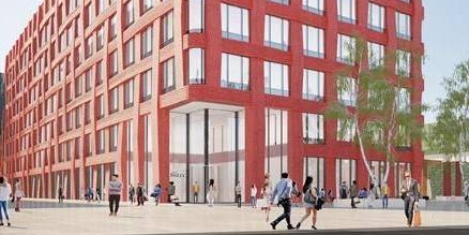







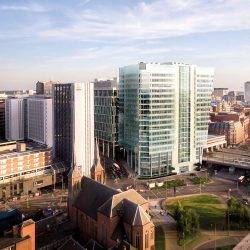 City centre take up reached 1,005,000 sq ft in Birmingham last year, 51 percent above the 10-year average of 666,000 sq ft which marked a record year, according to Savills Research. Growth was driven in part by the Government Property Unit (GPU) deal, as public services accounted for 27 percent of take-up in the city centre last year, including the 237,000 sq ft pre-let at Arena Central. Birmingham’s boom was also boasted by take-up from serviced office providers that reached 208,000 sq ft during 2017, the highest level on record and this accounted for 21 percent of the total take-up, more than any other regional city. There now remains a shortage of Prime Grade A space in Birmingham city centre following a number of large lettings. Prime Grade A space now stands at only 169,000 sq ft, enough for only six months of take-up at average levels. Major construction project, Three Snowhill won’t complete until the second quarter of next year, when it will deliver 420,000 sq ft of much needed Grade A office space on its completion. Until then, competition among occupiers will further intensify for Grade A space.
City centre take up reached 1,005,000 sq ft in Birmingham last year, 51 percent above the 10-year average of 666,000 sq ft which marked a record year, according to Savills Research. Growth was driven in part by the Government Property Unit (GPU) deal, as public services accounted for 27 percent of take-up in the city centre last year, including the 237,000 sq ft pre-let at Arena Central. Birmingham’s boom was also boasted by take-up from serviced office providers that reached 208,000 sq ft during 2017, the highest level on record and this accounted for 21 percent of the total take-up, more than any other regional city. There now remains a shortage of Prime Grade A space in Birmingham city centre following a number of large lettings. Prime Grade A space now stands at only 169,000 sq ft, enough for only six months of take-up at average levels. Major construction project, Three Snowhill won’t complete until the second quarter of next year, when it will deliver 420,000 sq ft of much needed Grade A office space on its completion. Until then, competition among occupiers will further intensify for Grade A space.






 Demand for office space in Scotland’s three largest cities pushed overall take-up beyond 2m sq ft last year, aided by a solid final quarter of occupational deals in Aberdeen and Glasgow, and an all-time record year for Edinburgh. Scotland’s offices market in 2017 reach ed2.4 million sq ft, 14 percent above the 10 year average, according to the latest Scottish Office Spotlight from Savills. In Edinburgh (city centre and wider market) office take-up amounted to a record 1.1 million sq ft boosted by the ongoing growth of tech in the city. According to data from Stack Overflow, the Scottish capital saw a 19 percent increase in data scientists employed in the city centre over the course of 2017. Activity places further pressure on supply with only 220,000 sq ft of Grade A now available which Savills suggests will push top rents to £34 per sq ft in 2018. Keith Dobson, director in the business space agency team at Savills in Edinburgh, says: “The soon to be completed 40,000 sq ft office scheme at 2 Semple Street will ease pent up demand come Q2 2018, whilst The Mint Building and Capital Square will complete in 2019 and 2020 respectively.”
Demand for office space in Scotland’s three largest cities pushed overall take-up beyond 2m sq ft last year, aided by a solid final quarter of occupational deals in Aberdeen and Glasgow, and an all-time record year for Edinburgh. Scotland’s offices market in 2017 reach ed2.4 million sq ft, 14 percent above the 10 year average, according to the latest Scottish Office Spotlight from Savills. In Edinburgh (city centre and wider market) office take-up amounted to a record 1.1 million sq ft boosted by the ongoing growth of tech in the city. According to data from Stack Overflow, the Scottish capital saw a 19 percent increase in data scientists employed in the city centre over the course of 2017. Activity places further pressure on supply with only 220,000 sq ft of Grade A now available which Savills suggests will push top rents to £34 per sq ft in 2018. Keith Dobson, director in the business space agency team at Savills in Edinburgh, says: “The soon to be completed 40,000 sq ft office scheme at 2 Semple Street will ease pent up demand come Q2 2018, whilst The Mint Building and Capital Square will complete in 2019 and 2020 respectively.”

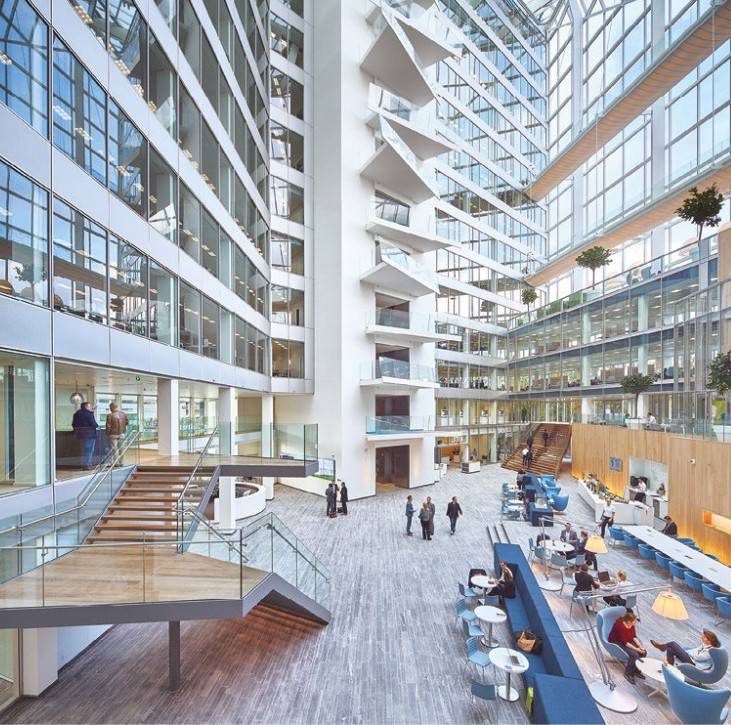
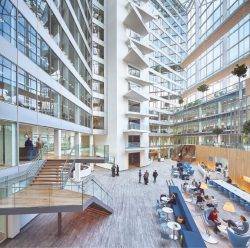 The creative team behind the development of the world’s most sustainable building – The Edge in Amsterdam – has announced the launch of a real estate technology company. EDGE Technologies, launched by OVG Real Estate CEO Coen van Oostrom will focus on creating a new generation of buildings which feature the latest innovations in sustainability and wellbeing. Whereas parent company OVG is focussed exclusively on the development of its existing portfolio, EDGE Technologies will focus on both the development and the long-term operations of this new generation of buildings, aiming for a cohesive experience across cities. Each EDGE building will be built and operated on the same technology platform and offer consistent user-centred design, created to serve the needs of today’s fast-changing and demanding workforce. To help achieve this the new company is launching a product that will capture and aggregate data across its properties in order to optimize, measure and inform both the user experience and the building’s environmental performance.
The creative team behind the development of the world’s most sustainable building – The Edge in Amsterdam – has announced the launch of a real estate technology company. EDGE Technologies, launched by OVG Real Estate CEO Coen van Oostrom will focus on creating a new generation of buildings which feature the latest innovations in sustainability and wellbeing. Whereas parent company OVG is focussed exclusively on the development of its existing portfolio, EDGE Technologies will focus on both the development and the long-term operations of this new generation of buildings, aiming for a cohesive experience across cities. Each EDGE building will be built and operated on the same technology platform and offer consistent user-centred design, created to serve the needs of today’s fast-changing and demanding workforce. To help achieve this the new company is launching a product that will capture and aggregate data across its properties in order to optimize, measure and inform both the user experience and the building’s environmental performance. 







March 20, 2018
Enter the MIPIM bandwagon, towed by pink elephants
by Anna King • Comment, Property, Technology
(more…)